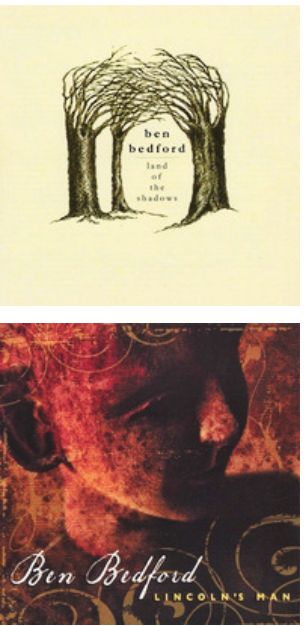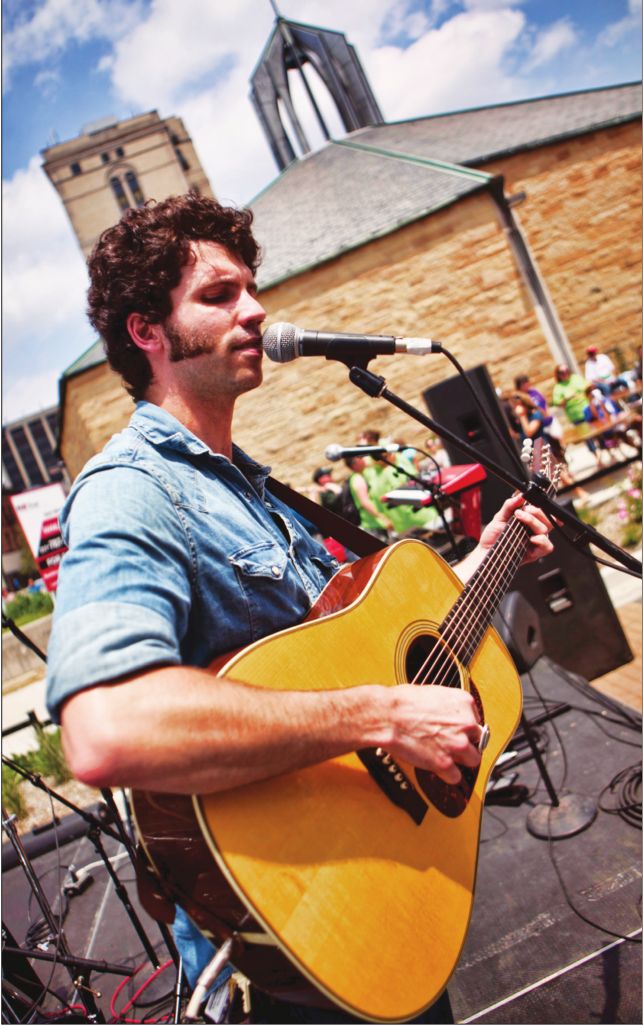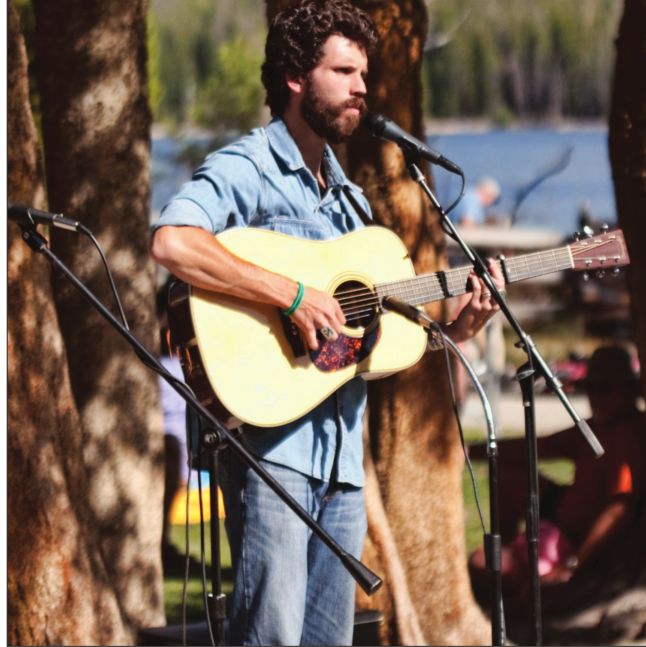
Prairie troubadour
The folk music of Ben Bedford
MUSIC | Tom Irwin
You’ve been warned, you won’t get far Life’s crooked as a scimitar Cut the cord there ain’t no doubt There’s one way in and one way out – John the Baptist
So goes the refrain of John the Baptist, the opening song on Ben Bedford’s latest record, What We Lost, sentiments that ring true across the ways of human existence. Driven by a bluesy romp from the accompanying musicians, led by Bedford’s forceful fingerpicking guitar, the words continue to speak of a lost world regained by redemption and filled with dangers. Phrases leap out to harass and inform, from “the present is just the recent past” and “a broken soul you cannot mend” to “never mind your tooth for tooth” and “a madman’s truth is still the truth” ending with the repeated, “you don’t have to be afraid to die,” as the mantra of John the Baptist and those who follow his lead.
These are strong and intense emotions from a 30-year-old guy from Chatham, Ill., who began a career in the singer-songwriter folk field less than 10 years ago, not sure where or how to begin. In the last five years since Bedford released his first album, Lincoln’s Man, to the unsuspecting folk music world, acclamation came fast, friendly and fortunately. On the strength of radio airplay, each of his three records have scored well on folk-based, singer-songwriter, roots-related charts, including the Folk DJ and Roots Rock listings in the U.S. and the Euro-American charts in Europe. Lincoln’s Man made most folk DJs’ “best of” list for 2008. Land of the Shadows, released in 2009, went to number one on the Folk DJ charts for most-played song and album for January and February of that year and also made many lists for top record of the year, plus reaching as high as number 12 on the Euro-American charts. Now in 2012, Bedford’s What We Lost, sits near the top of all three charts within a month of its release, an amazing and desirable position for a fledgling folk singer-songwriter.
More affirmations arrived in the past few years in the form of prestigious shows at well-established venues, such as the Bluebird Café in Nashville, Folkstage in Chicago, the Fayetteville Roots Festival in Arkansas. Bedford traveled to Sweden in 2008 and again in 2009 for shows and as a guest at songwriter retreats, plus played Izzy Young’s famed Folklore Centrum in Stockholm, then trouped through England, Scotland, the Netherlands, Belgium and France performing shows and giving interviews along the way. In July 2010, Rich Warren, a longtime folk DJ in Chicago and perennial force in the folk world, named Ben Bedford in his list of “50 most significant folk singer songwriters of the past 50 years” that included such notables as Bob Dylan, Townes Van Zandt, Judy Collins and John Prine. That’s a long way to come in only a few years in the music business, something that Bedford finds as surprising as anyone.
“The success I’ve had early on has been great. I’ve worked hard on the songs and hard on getting my music out there, and I guess the stars aligned correctly,” he stated. “I do wake up in the morning or I’m driving to a gig somewhere and smile, thinking, I’m playing music for a living. I feel very fortunate.”
 If I see you in the summer when this whole damn thing is done Maybe we will not remember what we lost and what we won – What We Lost
If I see you in the summer when this whole damn thing is done Maybe we will not remember what we lost and what we won – What We Lost
His recent rapid rise in songwriting stature is not as sudden as it appears. Each step along the way became a stopping point for the next push and the credits of one achievement led to the advancement of another. For Ben, the real adventure began as a young boy, always fascinated with music and creativity, in seeing the world as a place to discover, then describe.
“My first recollections of music were of a little orange record player that played those small records, 45s I guess, like of ‘Three Little Pigs’ or something, and I distinctly remember listening to albums of my parents by Willie Nelson, Don Williams, Gordon Lightfoot, The Beatles, Simon and Garfunkel and all those,” Bedford recalled. “And I can remember being a little tiny kid and imagining while I was listening to this music, that I could be one of those guys in the band.”
By age 14, influenced by fellow guitarist and teenage friend Levi Vincent, Ben began classical guitar lessons with the late Pauline Cormier, a well-known and respected guitar teacher and performer in Springfield who died tragically in 2010. Encouraged by Levi and supported by his parents, Chris (an accomplished visual artist) and Steve (a former teacher and longtime State Farm insurance agent) Bedford, in two years of lessons he became familiar with fingerpicking and left-hand finger movements that later shaped his dominant and distinct folkpicking style. From there he continued playing guitar out of sheer enjoyment, began singing and joined his local church band at the Sugar Creek Methodist Church, then discovered how to play other types of music, including blues, country, folk and the occasional pop song. By 16 he had a Gibson SG, trying to play the blues like BB King, but never really started a band like so many teenagers do. After graduating from Chatham-Glenwood High School in 2000, Bedford attended the University of Illinois in Champaign-Urbana, receiving a bachelor’s degree in history in 2004. Still focused on playing guitar as a single performer mostly for his own pleasure, he remained that way through his undergraduate years.
“I never really played in bands. I think I was in a band once for about 15 minutes or so in college,” he laughs. “And we played one house party for beer.”
The solo factor likely contributed to Bedford’s direction as a folk singersongwriter as he developed a style based on introspective, intense songs that aren’t in need of band accompaniment. By 2001 the writing bug bit and he began to toy around with putting words to music and vice versa. After graduating college and returning to the Springfield area, Ben attended a few open mics and the now-defunct Songwriter Circle held at the Underground City Tavern, gaining encouragement and defining his songs with public performance. A temporary job with the Illinois Historic Preservation Agency and gigs here and there paid the rent while he was recording with friends like Matt Johnson in Champaign and casually releasing lo-fi recordings for fans, family and friends.
Troubadour when you find what you are looking for Pull that silver pen and show the score But don’t you think you should go home to Illinois Get a little rest, atta boy – Vachel
In 2006 while searching for a different direction in a recording atmosphere, Ben contacted Sally Barris, a mutual friend met through Ann Bova and the Cabin Concerts music series (See “Ann Bova’s music magic,” IT, March 12, 2009). Sally, a well-connected and successful Nashville, Tenn., songstress, gave him names of a few producers she had worked with in Music City USA. From the list Ben contacted Chas Williams, a former guitarist for the likes of Nanci Griffith, Wynona Judd and other successful country-based artists. Williams took to Ben and his songs (the Birmingham, Ala., native saw no irony in recording Lincoln’s Man in his Robert E. Lee Studios in Franklin, Tenn.) and his easygoing professionalism and years of experience blended well with Bedford’s enthusiasm and inexperience to build a fertile space for camaraderie and mutual creativity.
“Sally gave me his number, I called him and he said, ‘Yeah man, come on down, let’s record some songs,’ and that was pretty much it,” Bedford recalled. “And I was unfamiliar with the professional recording procedure, so I had some questions like, will we be using microphones to record my guitar? The answer was, ‘Yes, we will be using microphones, some very good microphones to record your guitar.’ Then I found out he had all these connections to fantastic musicians in town, like Peter Young the drummer, who played on all three records. Chas and these guys were all super gentle with me and very supportive of my questions and learning in the studio.”
Williams kept the production focused squarely on the songs, adding sparse, yet effective instrumentation over the finely finger-picked tunes, placing the intense, word-laden lyrics at the core of the process. With the resulting first recording of Lincoln’s Man in hand early in 2007, Bedford pressed 1,000 copies and searched for ways to promote the CD. During a visit to a Chicago music conference in October of 2007 called Folk Alliance Region Midwest (FARM), the Folk Alliance International’s Midwest organization, he met Kari Estrin, a Nashville-based publicist and promotions person with years of experience and worlds of connections. The fit was a good one for Bedford as he hired on with Estrin to promote Lincoln’s Man and soon found an acceptance within the community as a rising songwriter and performer in the folk field.
“Kari was and is instrumental in getting my music out to a wider audience. She had me repackage Lincoln’s Man some and sent it out to folk radio and press,” he said. “She’s been involved in all three records and her connections and suggestions made all the difference in getting the music out there to be heard nationally and in Europe.”
Benefiting greatly from Estrin’s professional promotional work in getting the record to people who, if they liked it, could prove influential, the first album garnered considerable attention. The accolades rolled in, including affirmations from longtime folk DJs Rich Warren in Chicago (WFMT) and Ed Becker in St. Louis (KDHX), plus articles in magazines and a general “buzz” about the record. Perhaps the most significant review came when Arthur Wood, an influential voice in the United Kingdom on folk music, proclaimed that Bedford “has proven himself to be a truly inspired and talented storyteller.”
The praise and support continues as Land of the Shadows and now What We Lost elevated Bedford’s national status to one of a highly esteemed, young singer-songwriter destined for a fine career in folk music performance. The attention gained from the radio promotion attracted venues, especially the house concert and listening room hosts, allowing Ben to travel to various parts of the United States on a regular basis performing for receptive crowds and “drive my sweaty self from place to place playing music.”
And the trees did sing with the wind from the blue ice north As the sun went down they passed that apple back and forth No serpent’s grin refl ected in those hazel eyes Just a lover’s kiss and the empty sky – Empty Sky
Along with his promotional efforts and career achievements, Bedford advanced in other ways, including marrying Kari Bedford (named best photographer in IT’s 2012 Best of Springfield issue) in September of 2009. He and Kari live in an older distinguished neighborhood in near west Springfield with Kari’s daughters, Emily, 15, and Annelise, 10, plus a couple of cats, leading a hardworking but relaxed lifestyle of independent artists creating under the safe roof.

Native American leaders at the Wounded Knee confrontation in 1973. Through lyrical exposition on these various subjects, Bedford displays a technical veracity in combining emotional morsels with actual facts to blend the truth of history with the truth of mystery. This makes for interestingly complicated songs that defy easy categorization or quick listens.
“I really like story songs in general and I’m drawn to good stories. I think personal songs are really hard to write for me so I tend to write about these other things. Writers do infuse something in whatever they write and color the song a certain way – so there’s something of me in every song,” Bedford muses. “It’s easier for me to see the details in someone else’s life and story and outside events. I can sort of look at them objectively and pull a song together more as a short story than a Top 40 radio hit. Plus I think if you write just personal songs you close yourself off to many amazing subject matters. Why not imagine you’re Vachel Lindsay and write a song from that perspective?”
As the final breath of Autumn comes stealin’ across the fields You’ll be headed back along the Sangamon The last vestiges of summer have fallen from my hands You always said what’s gone is gone – Fallen What and where does a soon-to-be 31-yearold folksinger acclaimed across the country as a brilliant young writer do and go now?
“I want my music and lyrics to come from and be very Illinois, Midwestern, local, regional, with references to where we live. I was picturing central Illinois when writing What We Lost and what my grandfather experienced,” Ben explains.” My passion for songwriting feels fiery enough to continue to improve and want to keep going in making music my career. It’s a combination of many things – that desire to play, along with the support of Kari and my parents and lots of people cheering me on all along the way. In 10 years I’d love to still be doing what I’m doing. That works for me.”
Ben Bedford, with Kari Bedford on harmony vocals, celebrates the release of What We Lost on Tuesday, Nov. 20, 7:30 p.m. with a performance for the Prairie Grapevine Folklore Society concert series held at the Abraham Lincoln Unitarian Universalist Congregation, 745 Woodside Road, Springfield. For more information about Ben visit his website at BenBedford.com.
“ I think if you write just personal songs you close yourself off to many amazing subject matters. Why not imagine you’re Vachel Lindsay and write a song from that perspective?”
“Kari, my wife Kari, started singing with me in 2007 and she adds great harmonies to our songs and supports me 110 percent in making music,” said Ben. “She’s instrumental, no pun intended, in the songwriting process to me. She’s my first line of defense in not performing a bad song out in public. And she’s honest, yet diplomatic about it. Besides myself, of course, and the cats, she’s the first one to hear the new songs. She’s a great writer in general, for poetry and editing. She’s a fantastic person to hear the songs, she hears things I don’t and we use terminology like, ‘does the song sound true?’ I think people can hear that and that makes the difference on whether they understand and believe in the songs.”
The growth and advancement moves through the songwriting process into performance and instrumental betterment as well. Bedford puts time and effort into creating what he terms his “American Portrait Songwriting” style, using his love of history to study events and characters, composing songs with historical perspectives exposed through universal human sentiments. Topics range from the view of a Confederate soldier’s wife at Vicksburg, tragic consequences of a man losing his wife in childbirth near the Sangamon River, a soldier going against family wishes to enlist in the Union Army, the heroics and tragedy of the Cherry Mine disaster, the amazing feats of Amelia Earhart, looks at literary heroes such as Vachel Lindsay and Jack London, plus an interesting adventure into the mind of the late Harlington Wood, Jr. (a Springfield native with a career spanning several decades as a lawyer, judge, amateur Lincoln actor and federal negotiator) as he fronts the U.S. government delegation during talks with
continued on page 16